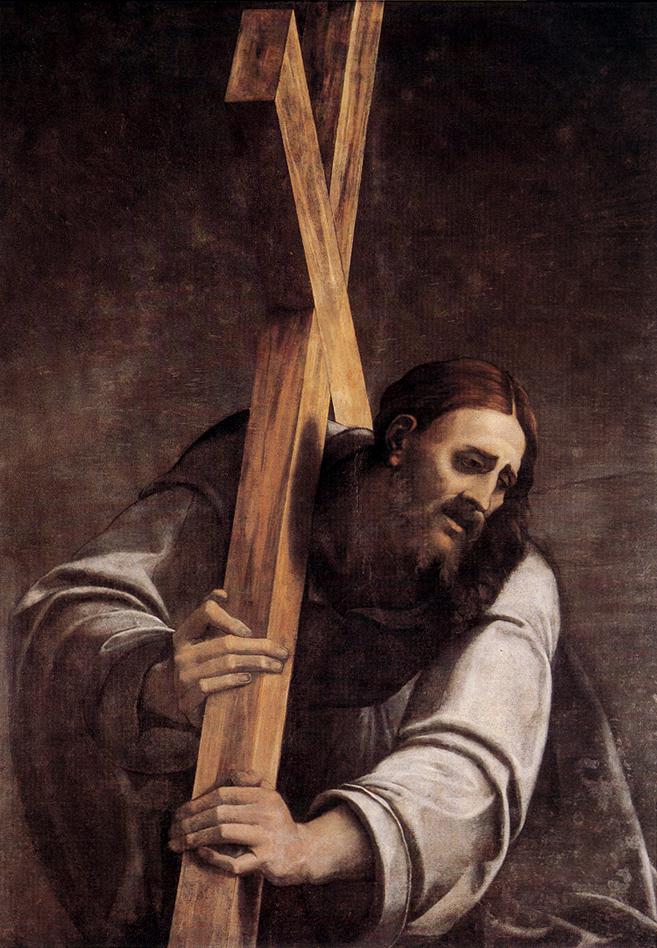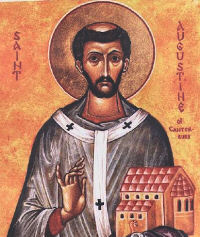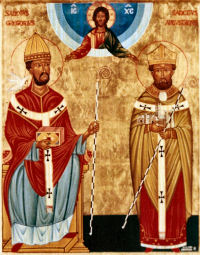32. And they were in the way going up to Jerusalem; and Jesus went before them: and they were amazed; and as they followed, they were afraid. And he took again the twelve, and began to tell them what things should happen to him,
33. Saying, Behold, we go up to Jerusalem; and the Son of man shall be delivered to the chief priests, and to the Scribes; and they shall condemn him to death, and shall deliver him to the Gentiles:
34. And they shall mock him, and shall scourge him, and shall spit upon him, and shall kill him: and the third day he shall rise again.
BEDE; The disciples remembered the discourse in which the Lord had foretold that He was about to suffer many things from the chief priests and scribes, and therefore in going up to Jerusalem, they were amazed. And this is what is meant, when it is Said, And they were in the way going up to Jerusalem, and Jesus went before them.
THEOPHYL. To show that He runs to meet His Passion, and that He does not refuse death, for the sake of our salvation; and they were amazed, and as they followed, they were afraid.
BEDE; Either lest they themselves should perish with Him, or at all events lest He, whose life and ministry was their joy, should fall under the hand of His enemies. But the Lord, foreseeing that the minds of His disciples would be troubled by His Passion, foretells to them both the pain of His Passion, and the glory of His resurrection; wherefore there follows, And he took again the twelve, and began to tell them what things should happen to him.
THEOPHYL. He did this to confirm the hearts of the disciples, that from hearing these things beforehand, they might the better bear them afterwards, and might not be alarmed at their suddenness, and also in order to show them that He suffered voluntarily; for he who fore-knows a danger, and flies not, though flight is in his power, evidently of his own will gives himself up to suffering. But He takes His disciples apart, because it was fitting that He should reveal the mystery of this Passion to those who were more closely connected with Him.
CHRYS. And He enumerates each thing that was to happen to Him; lest if He should pass any thing over, they should be troubled afterwards at suddenly seeing it; wherefore he adds, Behold, we go up to Jerusalem, and the Son of Man.
GLOSS. That is, He to whom suffering belongs; for the Godhead cannot suffer. Shall be delivered, that is, by Judas, to the Chief Priests, and to the Scribes, and they shall condemn him to death; judging Him to due guilty of death; and shall deliver him to the Gentiles, that is, to Pilate the Gentile; and his soldiers shall mock him, and shall spit upon him and scourge him, and put him to death.
CHRYS. But that when they were saddened on account of His passion and death, they should then also look for His resurrection, He adds, And the third day he shall rise again; for since He had not hid from them the sorrows and insults which happened, it was fitting that they should believe Him on other points.
35. And James and John, the sons of Zebedee, come to him, saying, Master, we would that you should do for us whatsoever we shall desire.
36. And he said to them, What would you that I should do for you?
37. They said to him, Grant to us that we may sit, one on your right hand, and the other on your left hand, in your glory.
38. But Jesus said to them, You know not what you ask: can you drink of the cup that I drink of? and be baptized with the baptism that I am baptized with?
39. And they said to him, We can. And Jesus said to them, You shall indeed drink of the cup that I drink of; and with the baptism that I am baptized withal shall you be baptized:
40. But to sit on my right hand and on my left hand is not mine to give; but it shall be given to them for whom it is prepared.
CHRYS. The disciples hearing Christ oftentimes speaking of His kingdom, thought that this kingdom was to be before His death, and therefore now that His death was foretold to them, they came to Him, that they might immediately be made worthy of the honors of the kingdom: wherefore it is said, And James and John, the sons of Zebedee, came to him, saying, Master, we would that you should do for us whatever we shall desire.
For ashamed of the human weakness which they felt, they came to Christ, taking Him apart from the disciples; but our Savior, not from ignorance of what they wanted to ask, but from a wish of making them answer Him, puts this question to them; And he said to them, What would you that I should do for you?
THEOPHYL. Now the above mentioned disciples thought that He was going up to Jerusalem, to reign there, and then to suffer what He had foretold. And with these thoughts, they desired to sit on the right and the left hand; wherefore there follows, They said to him, Grant to us that we may sit, one on your right hand, the other on your left hand, in the glory.
AUG. Matthew has expressed that this was said not by themselves, but by their mother, since she brought their wishes to the Lord; wherefore Mark briefly implies rather that they themselves, than that their mother, had used the words.
CHRYS. Or we may fitly say that both took place; for seeing themselves honored above the rest, they thought that they could easily obtain the foregoing petition; and that they might the more easily succeed in their request, they took their mother with them, that they might pray to Christ together with her.
AUG. Then the Lord both according to Mark, and too Matthew, answered them rather than their mother. For it goes on, But Jesus said to them, You know not what you ask.
THEOPHYL. It will not be as you think, that I am to reign as a temporal king in Jerusalem, but all these things, that is, these which belong to My kingdom, are beyond your understanding; for to sit on My right hand is so great a thing that it surpasses the Angelic orders.
BEDE; Or else, they know not what they ask, who seek from the Lord a seat of glory, which they do not yet merit.
CHRYS. Or else He says, You know not what you ask; as if He said, You speak of honors, but I am discoursing of wrestlings and toil; for this is not a time of rewards, but of blood, of battles, and dangers. Wherefore He adds, Can you drink of the cup that I drink of, and be baptized with the baptism that I am baptized withal? He draws them on by way of question, that by communication with Himself, their eagerness might increase.
THEOPHYL. But by the cup and baptism, He means the cross; the cup, that is, as being a potion by Him sweetly received, but baptism is the cause of the cleansing of our sins. And they answer Him, without understanding what He had said; wherefore it goes on: And they said to him, We can; for they thought that He spoke of a visible cup, and of the baptism of which the Jews made use, that is, the washings before their meals.
CHRYS. And they answered thus quickly, because they expected that what they had asked would he listened to; it goes on: And Jesus said to them, You shall indeed drink of the cup that I drink of, and with the baptism that I am baptized withal shall you be baptized; that is, you shall be worthy of martyrdom, and suffer even as I.
BEDE; A question is raised, however, how James and John drank the cup of martyrdom, or how they were baptized with the baptism of the Lord, when the Scripture relates, that only James the Apostle was beheaded by Herod whilst John finished his life by a natural death. But if we read ecclesiastical histories, in which it is related, that he also on account of the witness which he bore was cast into a cauldron of burning oil, and was immediately sent away to the island of Patmos, we shall then see that the spirit of martyrdom was in him, and that John drank the cup of confession, which the Three Children also drank in the furnace of fire, though the persecutor did not spill their blood. It goes on: But to sit on my right hand and on my left hand is not mine to give, but it shall be given to them for whom it is prepared.
CHRYS. Where two questions are raised, one is, whether a seat on His right hand is prepared for any one; the other, whether the Lord of all has it not in His power to give it to those for whom it is prepared. To the first then we say, that no one sits on His right hand or on His left, for that throne is inaccessible to a creature. How then did He say, To sit on my right hand or on my left is not mine to give you, as though it belonged to some who were to sit there? He however answers the thoughts of those who asked Him, condescending to their meaning; for they did not know that lofty throne and seat, which is on the right hand of the Father, but sought one thing alone, that is, to possess the chief place, and to be set Over others. And since they had heard it said of the Apostles, that they were to sit on twelve thrones, they begged for a place higher than all the rest, not knowing what was said.
To the second question we must say, that such a gift does not transcend the power of the Son of God, but what is said by Matthew, it is prepared by My Father, is the same as if it were said, "by Me" wherefore also Mark did not say here, by My Father. What therefore Christ says here is this, you shall die, he says, for Me, but this is not enough to enable you to obtain the highest place, for if another person comes possessing besides martyrdom all other virtues, he will possess much more than you; for the chief place is prepared for those, who by works are enabled to become the first. Thus then the Lord instructed them not to trouble themselves vainly and absurdly for high places; at the same time He would not have Him made sad.
BEDE; Or else, it is not mine to give to you, that is, to proud persons, for such as yet they were. It is prepared for other persons, and be you other, that is, lowly, and it is prepared for you.
41. And when the ten heard it, they began to be much displeased with James and John.
42. But Jesus called them to him, and said to them, you know that they which are accounted to rule over the Gentiles exercise lordship over them; and their great ones exercise authority upon them.
43. But so shall it not be among you: hut whoever will be great among you, shall be your minister:
44. And whoever of you will be the chiefest, shall be servant of all.
45. For even the Son of man came not to be ministered to, but to minister, and to give his life a ransom for many.
THEOPHYL. The other Apostles are indignant at seeing James and John seeking for honor; wherefore it is said, And when the ten heard it, they began to be much displeased with James and John. For being influenced by human feeling, they were moved with envy; and their first displeasure arose from their seeing that they were not taken up by the Lord; before that time they were not displeased, because they saw that they themselves were honored before other men. At this time the Apostles were thus imperfect, but afterwards they yielded the chief place one to another.
Christ however cures them; first indeed by drawing them to Himself in order to comfort them; and his is meant, when it is said, But Jesus called them to him; then by showing them that to usurp honor, and to desire the chief place, belongs to Gentiles. Wherefore there follows: And said to them, you know that they which are accounted to rule over the Gentiles exercise lordship; and their great ones exercise authority over them. The great ones of the Gentiles thrust themselves into the chief place tyrannically and as lords. It goes on: But so shall it not be among you.
BEDE; In which He teaches, that he is the greater, who is the less, and that he becomes the lord, who is servant of all: vain, therefore, was it both for the one party to seek for immoderate things, and the other to be annoyed at their desiring greater things, since we are to arrive at the height of virtue not by power but by humility. Then He proposes an example, that if they lightly regarded His words, His deeds might make them ashamed, saying, For even the Son of man came not to be ministered to, but to minister, and to give his life a ransom for many.
THEOPHYL. Which is a greater thing than to minister. For what can be greater or more wonderful than that a man should die for him to whom he ministers?
Nevertheless, this serving and condescension of humility was His glory, and that of all; for before He was made man, He was known only to the Angels; but now that lie has become man and has been crucified, He not only has glory Himself; but also has taken up others to a participation in His glory, and ruled by faith over the whole world.
BEDE; He did not say, however, that He gave His life as a ransom for all, but for many, that is, for those who would believe on Him.
Catena Aurea Mark 10



 St. Augustine was the agent of a greater man than himself, Pope St. Gregory the Great. In Gregory's time, except for the Irish monks, missionary activity was unknown in the western Church, and it is Gregory's glory to have revived it. He decided to begin with a mission to the pagan English, for they had cut off the Christian Celts from the rest of Christendom. The time was favorable for a mission since the ruler of the whole of southern England, Ethelbert of Kent, had married a Christian wife and had received a Gaulish bishop at his court. Gregory himself wished to come to Britain, but his election as pope put an end to any such idea, and in 596 he decided to send an Italian monk following the comparatively new Rule of St Benedict. Augustine set out with some companions, but when they reached southern Gaul a crisis occurred and Augustine was sent back to the pope for help. In reply the pope made Augustine their abbot and subjected the rest of the party to him in all things, and with this authority Augustine successfully reached England in 597, landing in Kent on the Isle of Thanet. Ethelbert and the men of Kent refused to accept Christianity at first, although an ancient British church dedicated to St Martin was restored for Augustine's use; but very shortly afterwards Ethelbert was baptized and, the pope having been consulted, a plan was prepared for the removal of the chief see from Canterbury to London and the establishment of another province at York. Events prevented either of these projects from being fulfilled, but the progress of the mission was continuous until Augustine's death, somewhere between 604 and 609.
St. Augustine was the agent of a greater man than himself, Pope St. Gregory the Great. In Gregory's time, except for the Irish monks, missionary activity was unknown in the western Church, and it is Gregory's glory to have revived it. He decided to begin with a mission to the pagan English, for they had cut off the Christian Celts from the rest of Christendom. The time was favorable for a mission since the ruler of the whole of southern England, Ethelbert of Kent, had married a Christian wife and had received a Gaulish bishop at his court. Gregory himself wished to come to Britain, but his election as pope put an end to any such idea, and in 596 he decided to send an Italian monk following the comparatively new Rule of St Benedict. Augustine set out with some companions, but when they reached southern Gaul a crisis occurred and Augustine was sent back to the pope for help. In reply the pope made Augustine their abbot and subjected the rest of the party to him in all things, and with this authority Augustine successfully reached England in 597, landing in Kent on the Isle of Thanet. Ethelbert and the men of Kent refused to accept Christianity at first, although an ancient British church dedicated to St Martin was restored for Augustine's use; but very shortly afterwards Ethelbert was baptized and, the pope having been consulted, a plan was prepared for the removal of the chief see from Canterbury to London and the establishment of another province at York. Events prevented either of these projects from being fulfilled, but the progress of the mission was continuous until Augustine's death, somewhere between 604 and 609.